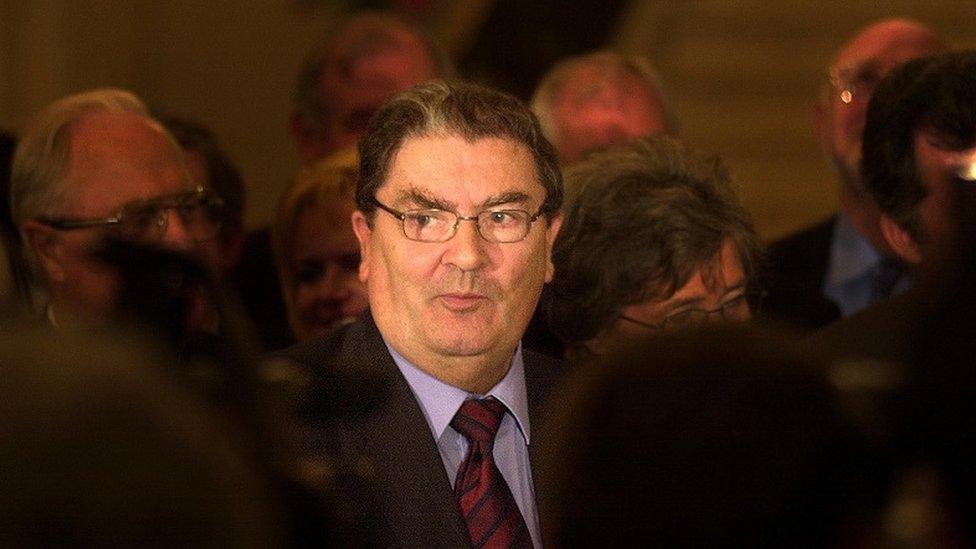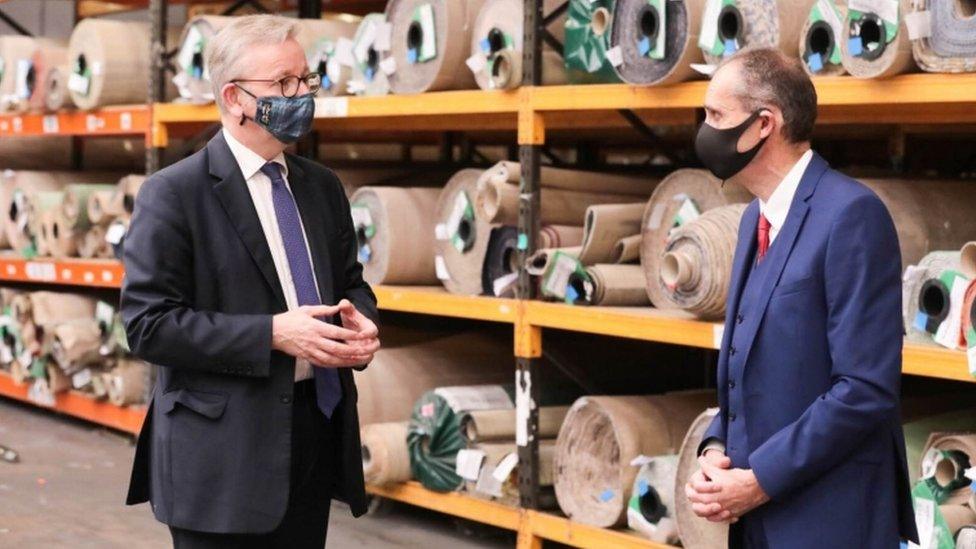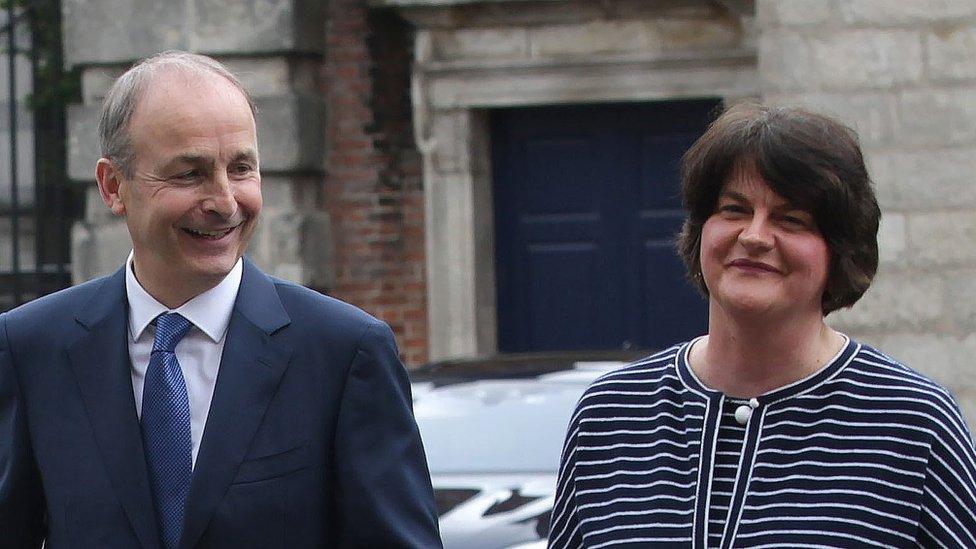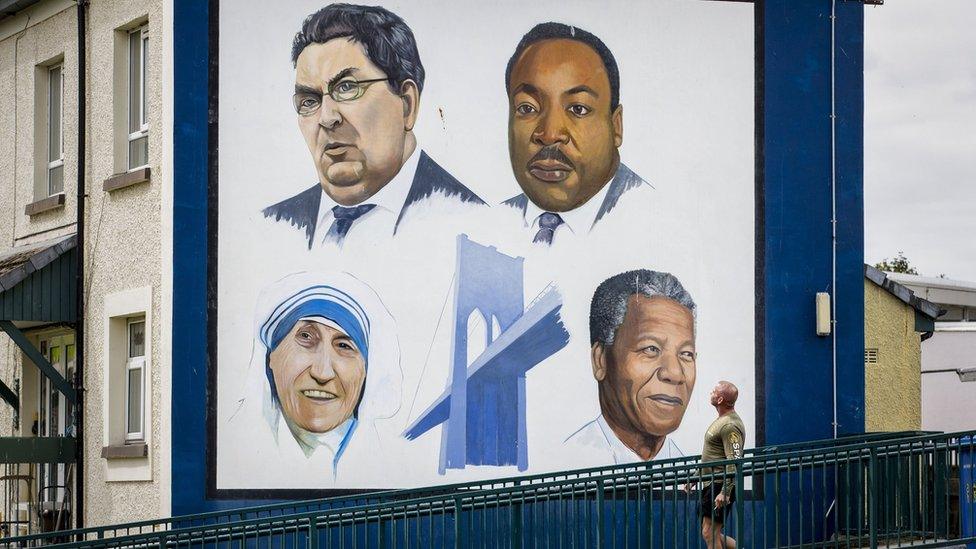Hume, Brexit and planning for NI's big birthday
- Published

John Hume played a crucial role in helping to broker the IRA ceasefire of 1994
After a week dominated by memories of John Hume, the UK Cabinet Office Minister Michael Gove dropped in to talk up the benefits of Brexit.
That's something which there's no doubt would have been complete anathema to the Europhile Nobel Peace Prize winner.
After touring a carpet factory in Portadown, Mr Gove told me that - under the aegis of Brexit and the Northern Ireland protocol - local firms will enjoy the best of both worlds.
Their full access to both the EU and UK markets will, he argued, make them the envy of their Scottish counterparts.
Let's hope he's right.
Although one wonders why, if Northern Ireland's one foot in, one foot out status will be so attractive, Theresa May's deal - which effectively extended this across the UK - proved so disagreeable to English Brexiteers?
Three hundred and fifty-five million pounds in government funding to meet the cost of the extra paperwork required after 31 December will undoubtedly be a relief to local businesses.
However, during the referendum no-one plastered on the side of any bus that hundreds of millions of pounds would in the future be needed to regulate trade between one part of the UK and another.

Michael Gove visited a carpet factory in Portadown
Arlene Foster had breakfast with Mr Gove at Hillsborough Castle and - apart from mulling over Brexit - discussed how the UK government could "in partnership with the Northern Ireland Executive... utilise Northern Ireland's centenary next year to showcase Northern Ireland across the world".
The DUP aren't the only ones looking forward to Northern Ireland's 100th birthday in 2021.
The TUV published a lengthy wishlist, ranging from a visit by the Queen to a fly past by the Red Arrows via the issue of special commemorative stamps and coins.
Even at a time of pandemic, then, thoughts are turning to the centenary celebrations. The problem is, of course, that not everyone will view 2021 as something to celebrate.
Are we marking the birth of a new state or the partition of an island?
Are we remembering the glorious contributions of individual Ulster men and women to the UK and the world, from Frank Pantridge to George Best and Mary Peters?
Or debating the altogether more contentious days of the Unionist monolith and the "Protestant parliament for a Protestant people"?
The answer is, of course, all of the above.
Just like the anniversary of the 1916 Easter Rising, the story of Northern Ireland's centenary will evoke mixed emotions.

Arlene Foster was not impressed by comments from Taoiseach (Irish PM) Micheál Martin
Although the DUP statement issued after Mrs Foster's meeting with Mr Gove referred to the UK government working "in partnership" with the Stormont Executive, it's obvious - given their completely contrasting ideologies - that the DUP and Sinn Féin will experience major difficulties reaching agreement on a joint narrative regarding the centenary.
Already there are signs that the Northern Ireland Office might move to fill the potential void, convening a range of working groups to ruminate on how best to handle the proceedings.
For this is a marker which will not only be about the past, but also about the future. Will Northern Ireland reach its 200th, 150th or 120th birthdays?
Micheál Martin isn't sure.
In a newspaper interview, he allowed himself to think aloud about whether the growing sense of English nationalism, which many believe fuelled the Brexit vote, will lead to Scotland breaking away from the UK and England "turning off" its commitment to Northern Ireland.
Mrs Foster wasn't impressed, describing the taoiseach's speculation as a "dubious theory".

The John and Pat Hume Foundation is expected to be launched later this year
Which brings us back to John Hume.
If he was in his prime today, he would almost certainly be depressed about Brexit.
But after a few choice words, it would have been in his nature to analyse the tensions now in play and strategise for the future.
Above all he would have wanted to ensure that whatever changes occur across our islands in the coming decades happen peacefully and respect our diversity and mutual interdependence.
This will be part of the mission of the "John and Pat Hume Foundation" - expected to be launched later this year.
The foundation is likely to promote conflict resolution around the world but will no doubt also be mindful of Mr Hume's vision of an "agreed Ireland".
Between the pandemic, the centenary, Brexit and the uncertain constitutional future, there's plenty for those involved in the new foundation or indeed any other think tanks to be getting their heads around.
